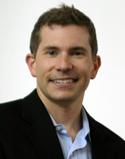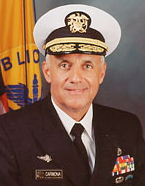Berkeley, Calif. – It’s hard to pick up a newspaper anywhere in this country without reading about a community debating a smoke-free ordinance.
 One influential hand in that on-going societal change is Wabash College graduate, Bronson Frick ’95. Frick is the Associate Director for Americans for Non-smokers Rights based in Berkeley. His organization has provided grass root support and training to groups trying to pass such ordinances.
One influential hand in that on-going societal change is Wabash College graduate, Bronson Frick ’95. Frick is the Associate Director for Americans for Non-smokers Rights based in Berkeley. His organization has provided grass root support and training to groups trying to pass such ordinances.
Crawfordsville’s City Council was poised to enact a smoke-free law but but did not take a final vote when the city's mayor threatened a veto. Across the country such local control ordinances are multiplying.
On June 27 in Washington D.C. advocates for protecting non-smokers may have gotten a new weapon in their arsenal to persuade local lawmakers to pass such laws.
 Surgeon General Vice Admiral Richard H. Carmona presented the nation’s first full report on second-hand smoke since 1986.
Surgeon General Vice Admiral Richard H. Carmona presented the nation’s first full report on second-hand smoke since 1986.
"I’m assuming it will say second-hand smoke is still killing folks," Frick said earlier this month. "I’ll be at the press conference in D.C. with the Surgeon General, and organizationally we’re really looking forward to it. We’ll be there on behalf of all our members, on behalf of all the flight attendants who died from second-hand smoke and everyone else that’s still being exposed."
There’s little question the non-smoking movement is growing, according to Americans for Non-Smokers rights. Across the country Washington, New York, Massachusetts, Rhode Island, New Jersey and Delaware have enacted state laws legislating 100 percent smoke free workplaces, restaurants and bars. In California, Idaho, Utah, Montana, North Dakota, South Dakota, Florida, Maine, Vermont and Connecticut, laws have been enacted state wide mandating either workplace or restaurants smoking bans.
Colorado, Montana, and Utah have enacted statewide smoking bans that have not gone into effect yet governing workplaces or restaurants/bars.
"The growth of smoke free ordinances is really attributed to the clear, scientific evidence around the health hazards of second hand smoke, increased public understanding of those health hazards and the response of elected officials to those concerns," Frick explained. "Opponents, particularly tobacco companies, try to frame this as an issue of smoking versus non-smoking. This is about everyone’s right to breathe air without being harmed by second hand smoke."
On homepage: Frick consults with one of the organization's researchers on recent statistics showing the number of communities and states that have adopted non-smoking ordinances.
Editor's Note: Frick was one of nine Wabash College graduates we recently visited in California. Full stories on the graduates will be published later this year in Wabash Magazine and on the college website.